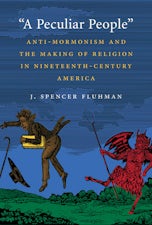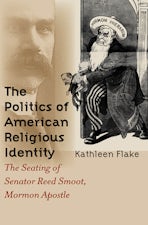Railroading Religion
Mormons, Tourists, and the Corporate Spirit of the West
By David Walker
352 pp., 6.125 x 9.25, 23 halftones, notes, bibl., index
-
Paperback ISBN: 978-1-4696-5320-4
Published: September 2019 -
E-book EPUB ISBN: 978-1-4696-5321-1
Published: August 2019 -
E-book PDF ISBN: 979-8-8908-5287-8
Published: August 2019 -
Hardcover ISBN: 978-1-4696-5319-8
Published: September 2019
Buy this Book
- Paperback $39.95
- Hardcover $99.00
- E-Book $22.99
For Professors:
Free E-Exam Copies
Awards & distinctions
2020 Best Book Award, Mormon History Association
Economic and political victory in the West required the production of knowledge about different religious groups settling in its lands. As ordinary Americans advanced their own theories about Mormondom, they contributed to the rise of religion itself as a category of popular and scholarly imagination. At the same time, new and advantageous railroad-related alliances catalyzed LDS Church officials to build increasingly dynamic religious institutions. Through scrupulous research and wide-ranging theoretical engagement, Walker shows that western railroads did not eradicate or diminish Mormon power. To the contrary, railroad promoters helped establish Mormonism as a normative American religion.
About the Author
David Walker is assistant professor of religious studies at the University of California, Santa Barbara.
For more information about David Walker, visit
the
Author
Page.
Reviews
“This insightful book will be useful to those interested in railroads and the development of the West as well as those interested in Mormonism.”--CHOICE
“Embracing the material turn in religious studies, Walker writes about tourist sites, trains, and beaches, among other things, as major parts of nineteenth-century religion that illustrate the complexity of the boundaries of religion as a category. Importantly, the book contributes to an understudied period of Mormonism’s American history (1860s-1890s) and brings an exciting analysis to its subject matter.”--Journal of the American Academy of Religion
“Railroading Religion is one of the most theoretically rich and provocatively argued books written on Mormon studies in quite some time. While the benefits for those who work on Mormonism are clear, scholars of religion will also be forced to consider dominant ideas concerning secularism and religion, not to mention modernity.”--Church History and Religious Culture
"A fascinating book ... historically rich and theoretically provocative ... a wonderfully concrete and well-documented example of the social construction of sacred space."--Religion
“Walker tells the story of Mormonism’s evolution during the Utah period in a new way. His approach asks scholars to reconsider long-held beliefs and theories about religion. Through compelling arguments, historical insight, and innovative storytelling, Railroading Religion is valuable for anyone interested in the history of the American West and nineteenth-century secularism.”--Nova Religio
“Walker’s book provides a shining example of how to practice a historiography of religions that incorporates, and builds upon, secularity theory’s best insights.” – Mormon Studies Review



